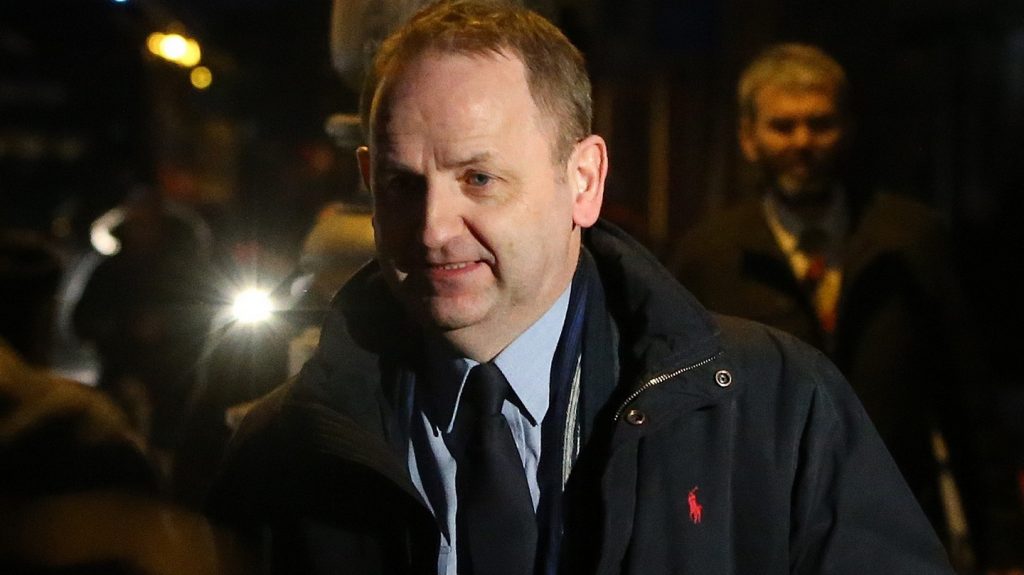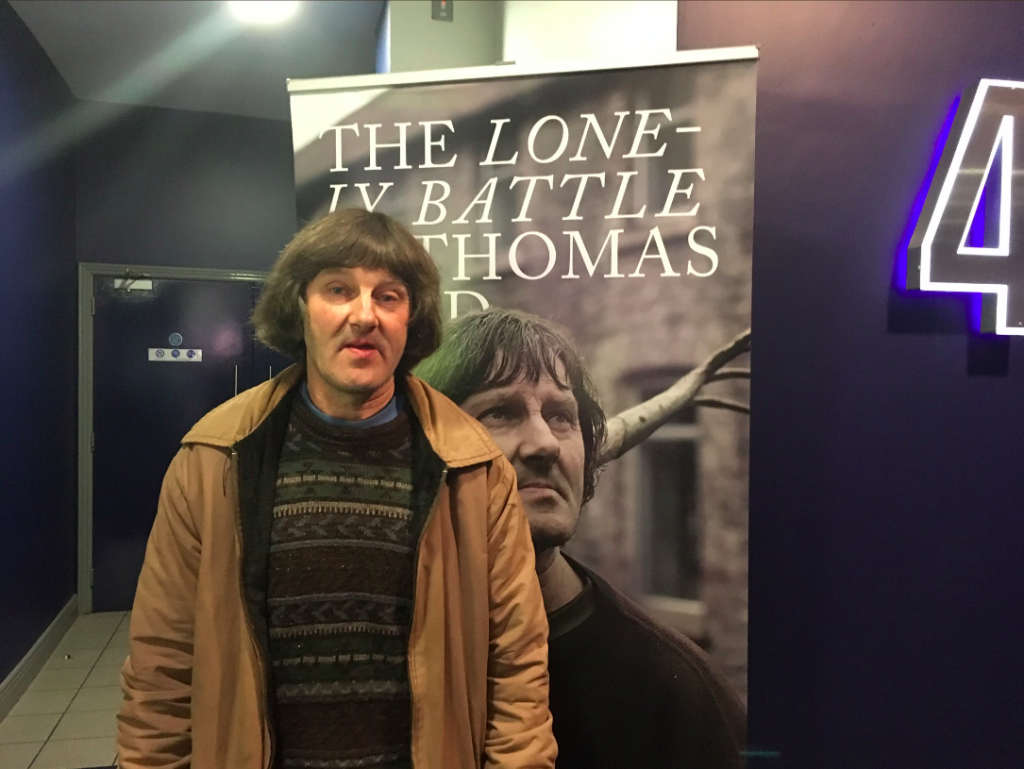
In recent months, Irish audiences have fallen love with a very different type of hero at the cinema—one who wields a pitchfork rather than dons a cape. Farmers have dominated the screen in recent times, between The Pipe, Pilgrim Hill, The Silver Branch, and—most prominently—The Lonely Battle of Thomas Reid. This innovative hybrid of documentary and dramatic reconstruction, with the titular subject playing himself in reenactments of key events surrounding the fight to protect his family land from the state, led the charge in something of an emerging mini-movement within Irish cinema. These films personify the ongoing identity crisis within Ireland—the old against the new, and what people are willing to sacrifice to move into a future where Ireland has increasing influence on the world stage.
One Man Against The State
Director Feargal Ward’s film, set in the south-east county of Kildare, opens with eccentric beef cattle farmer Thomas Reid feeding a calf. What becomes immediately clear—accentuated by the director’s own cinematography and Tadgh O’Sullivan’s evocative editing and sound design, which paint an idyllic, nostalgic picture of the run-down farmland—is that Reid is a man content with his slightly unusual situation—he is a bachelor (not entirely uncommon for a certain subsection of Irish agriculturalists) and a hoarder. Some of the funniest parts of the film take place in his 18th-century farmhouse, where he talks the viewer through his heaps of vintage vinyl records and VHS cassettes filled with recordings of Dallas.
The film does not judge Thomas Reid’s lifestyle. He presents himself as stubborn, principledm, and someone with a big heart for those who he holds dear—be it his late mother, or the cattle on his farm. He seems to be a man out of time within a rapidly progressing world—especially when contrasted with his neighbor.
“You won’t sell for any price?”
“No, no price. No price.”
Thomas’ farm is located next to a massive computer chip processing plant run by American computer giant Intel. There are some stunning, almost Kubrickian shots comparing the industrial giant to the humble and ancient farm. However, it is far too easy to assume the central conflict is about Thomas and his neighbor—rather, it is the IDA (or Industrial Development Authority) who becomes an antagonistic force to Thomas.

If a man’s home is his castle, our introduction to the men representing the IDA is tantamount to invaders tearing down the drawbridge and storming through all defenses. They tell Thomas his land has been deemed “most appropriate” for future development. Turning down an undisclosed amount, believed to be in the millions, Thomas refuses the IDA’s offer, only to be met with a compulsory purchase order, tearing him away from the land and farmhouse that’s been in his family for generations. The film then charts Thomas’ lonely battle through the courts against the CPO to hold onto all that he holds dear.
The film is very careful is not to present a one-sided view. Instead, Ward manages to present both sides of the argument. And whilst the closest thing that the film has to an antagonist is in the wrong for its conduct, a complex moral dilemma lies at the heart of the film—whilst Thomas Reid’s case is an exception to the rule, is the rule justified?

The Price of Progress
It cannot be a coincidence that so many films about hero farmers are showing up so close to each other. They represent the Irish individual being faced with some serious crises, both literal and metaphorical. Compared to the ongoing disaster their neighbors inflict upon themselves, Ireland is far out in front. However, something is rotten in the state of Leinster.
The nation has plenty of its own issues—for example, in the recent presidential elections, where incumbent Michael D. Higgins—renowned for his patronage of the arts, and subject to a grassroots “Keep The Poet” campaign—comfortably won by a landslide. However, outsider Peter Casey shot up in a matter of weeks from 2% of the vote to 20% following controversial statements about Ireland’s traveller communities. Fortunately, the position of President is far more of an ambassadorial role and less a legislative one. Still, this bears worrying parallels with the elections of figures like Jair Bolsonaro, Donald Trump, Matteo Salvini and Viktor Orbán.

The farmers featured in The Lonely Battle Of Thomas Reid, The Silver Branch and The Pipe represent the individual either swallowed up by the state, or fading from their view. It’s all well and good to boast statistics of economic growth; increased development and investment from abroad, but at what cost? How many are left behind and are the majority benefitting from the relentless pursuit of progress? How can progress be judged? Who exactly benefits from Ireland’s modernization, and how many are suffering so the country can keep up with the competition?
If these questions cannot be answered, it could easily fuel empty sentiment from the likes of Peter Casey—something echoed in the rise of Trump, Bolsonaro et al. If people feel left behind, in the pursuit of an agenda that doesn’t benefit them, recent history shows that it will not end well.
Whilst the end of the film won’t be revealed in this article, it is unfortunately not the end of the story. Threat still looms over Thomas’ world—namely his farm. This is not a Hollywood movie, with conflicts tied up in a neat little bow—his lonely battle is far from over. Thomas Reid happens to have had his story unfold well within the public eye, even before Ward’s documentary was released. There are many more whose stories have not been told, and are not subject to public pressure on the state to resolve what could be perceived as persecution.
Thomas Reid’s story draws some loose parallels to the story of whistleblowers Maurice McCabe and John Wilson—two policemen who tried to do the right thing and were unjustly put through years of hell by those in positions of authority. This story was one that, even more than Reid’s, played out in front of the nation, and one that garnered their sympathy—it seems the Irish people will take the side of the little man standing up against the state. McCabe and Wilson’s struggles were documented in Máire Kearney’s documentary Whistleblower for RTE, Ireland’s national broadcaster. It seems like no coincidence that Kearney also directed TV documentary The Battle for Rural Ireland.

Ireland’s Identity Crisis
Black 47 —a brutal revenge thriller set during the Potato Famine, a devastating event caused by British rule—was one of the biggest native box office successes that Ireland has had in quite a while, reminding audiences of the not-so-distant past. Whilst the country has come leaps and bounds since then, Ireland’s relationship with progress within the last forty years has been complicated. Most notable is The Celtic Tiger—a period of dramatic economic growth for Ireland between roughly 1995 and 2008—which roared and then led to economic collapse—a precursor to the 2009 global financial crisis, leaving future generations to foot the bill.
Most telling of Ireland’s changing identity is the country’s changing relationship with the Roman Catholic church, an institution that defined the country’s attitudes towards progress. Many great films, such as The Magdalene Sisters and Philomena, depict this. At the Pope’s recent visit in late August of last year, crowds of almost a million were expected—still a significant decrease on the 2.5 million that attended the last Papal visit in 1979. However, the number was closer to 100,000. Last year’s landmark referendum for legalizing abortion, with 66% voting to do so, is further evidence that Ireland is changing rapidly, occupied with moving on from a past so closely associated with Catholicism.

But there are consequences to this seismic shift in society—as it embraces progressivism, powerful forces do what they must to ensure there is an economy that is as forward-facing as those contributing to it. And, as demonstrated by Lonely Battle, that means moving away from a focus on rural activities in favor of more foreign investments to create jobs—a point relentlessly repeated by the film’s “antagonists”.
What was fascinating to observe was the kind of audiences turning up to see Ward’s film. As this writer assisted the film’s producers during its theatrical run, we received reports of some farmers driving fifty miles to see Lonely Battle at the nearest venue screening it. Reid himself showed up to the film’s County Kildare premiere—his first trip to the cinema in thirty years. When audiences make such efforts, and discussion is incited beyond the confines of the screening room, it is clear that a story has struck a national nerve.

After centuries of oppression and misfortune, it could be said that some in Ireland don’t quite know how to handle the newfound wealth and success—especially within rural Ireland, a world unto itself. After playing the underdog for so long, they are looked to as an example now, and their voice counts in the international community, especially as the country benefits from many people and business fleeing Brexit Britain yet keen to retain close geographical links—it isn’t implausible to say that Dublin will inherit the role that London has played for so long as the gateway to Europe.
Thomas Reid, wandering around a massive supermarket with automated voices ringing through the aisles, surrounded by a choice of affordable food from around the world, serves as the perfect metaphor for this. It is a world he understands, but even though it is happening around him, he is not entirely ready to embrace it yet.
Another surreal image as word-for-word court statements are reenacted by performers, is that of bewigged lawyers standing in Reid’s farmland, sticking out like sore thumbs—a genius decision by the director that further accentuates the contrast between Rural and State institutions.
Despite the saturation of a certain image being presented of Ireland by any number of films, it is not a nation of complacent, genial people. It is a nation of passion, concern and rage that has made its voice heard over the centuries in methods either violent or unconventional. Unlike many countries, it has consistently performed this through the prism of artistic expression—mournful music, humorous poetry and epic novels covering a broad range of the emotions of Ireland’s people. It is a country that has produced some of the finest wordsmiths in history, such as James Joyce and Oscar Wilde, who perfectly captured the national character.

Today’s filmmakers—like Ward, Kearney, and Katrina Costello (The Silver Branch)—are merely carrying on the Irish literary tradition through the screen. It is in this medium where Ireland continues to produces its most effective expressions of airing grievances against the system, and exploring their rapidly evolving identity.
In lieu of a Superman, Ireland has to settle for its own Captain Americas—farmers like Thomas Reid and The Silver Branch‘s Patrick McCormack, who represent the country’s past, its struggles and identity crisis; Whistleblowers like Maurice McCabe and John Wilson, willing to risk everything to do the right thing. In times of great division, international audiences would do well to turn to Ireland for everyday heroes, standing up for themselves in a nation still wracked with existential crisis in amongst relentless progress and vast, enriching multicultural diversity. It is not just Ireland where people like Thomas are trying to figure out their place in this new world.
The Lonely Battle of Thomas Reid — Ireland. Directed by Feargal Ward. Dialog in English. First released November 2017. Running time 1 hr 21 minutes.
Conflict of interest disclosure on Sep 1 2019: the author of this article worked as a marketing and distribution assistant for The Lonely Battle of Thomas Reid. Cinema Escapist endeavors to prevent future instances of such conflicts of interest.